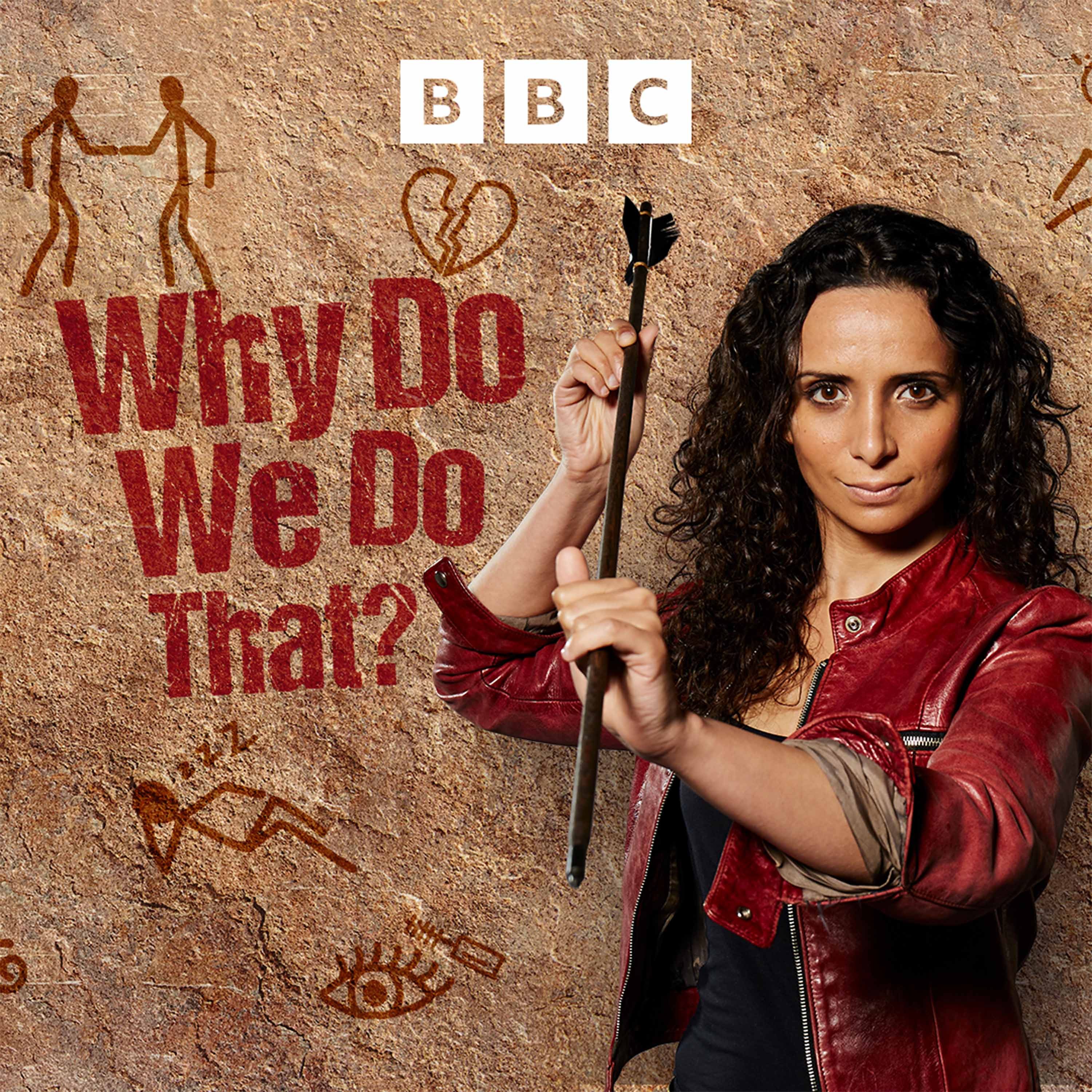

Why Do We Do That?
BBC Radio 4
Why Do We Do That? An anthropologist's guide to the modern world.There are lots of everyday things which, when you think about them, are pretty weird. Like kissing, doomscrolling and sitting down to go to the loo. Social media may tell you to blame the latest influencer who went viral. Your therapist might tell you to blame your parents. But palaeoanthropologist Ella Al-Shamahi is here to tell you to blame your great, great, great, great, great, etc. grandparents. For some stuff at least. In this series, Ella is joined by some wonderful guests to dive into the cultural, historical and evolutionary story of everyday human habits and behaviour.Photo: Sarah Cresswell / The Times / News Licensing
Episodes
Mentioned books

Mar 14, 2025 • 18min
More... Blushing with Laith Al-Shawaf
Ella Al-Shamahi explores evolutionary mysteries in More Blushing with Laith Al-Shawaf.BBC Studios Audio
Producer: Olivia Jani
Additional Production: Emily Bird
Series Producer: Geraldine Fitzgerald
Executive Producer: Alexandra Feachem

Mar 14, 2025 • 14min
7. Why do we blush?
Paleoanthropologist Ella Al-Shamahi asks why we blush. Even Darwin was intrigued by blushing. He called it “the most peculiar and most human of all expression” but didn’t think it had a function. Dr Laith Al-Shawaf from the University of Colorado makes students do embarrassing things to understand why we blush and how blushing can make people like you more when you make a mistake.

Mar 7, 2025 • 16min
More... Lies with Roman Stengelin
Ella Al-Shamahi explores evolutionary mysteries in More Lies with Roman Stengelin.BBC Studios Audio
Producer: Olivia Jani
Additional Production: Emily Bird
Series Producer: Geraldine Fitzgerald
Executive Producer: Alexandra Feachem

Mar 7, 2025 • 15min
6. Why do we lie?
Ella Al-Shamahi asks why do we lie?
You might think that deception is a uniquely human characteristic, but does camouflage or mimicry in nature, where animals pretend to be another animal or the actual environment like the insects leaf-mimic katydids that walk around looking like a leaf. Does that count as lying? Or is it just us humans with our highly complex language that have the ability to tell a fib. Ella talks to Dr Roman Stengelin of the Max Planck Institute for Evolutionary Anthropology, who investigates children from very different cultures to discover when and how they develop this very human ability and professional poker player Liv Boeree to discover the art of bluffing.BBC Studios
Produced by Emily Bird
Additional production Olivia Jani and Ben Hughes
Series Producer Geraldine Fitzgerald
Executive Producer Alexandra Feachem
Commissioning Editor Rhian Roberts

Feb 28, 2025 • 17min
More... Laughs with Sophie Scott
Sophie Scott, a Professor of Neuroscience at University College London, dives into the fascinating world of laughter. She explains how laughter is not just about humor but also vital for social bonding. The conversation highlights playful behaviors in animals, revealing surprising emotional depths. Scott discusses laughter's role in fostering relationships, linking it to physiological benefits like stress reduction. The episode also explores how laughter enhances connections in stand-up comedy, underscoring its unique social power.

Feb 28, 2025 • 15min
5. Why do we laugh?
In this engaging discussion, neuroscientist Sophie Scott from University College London dives into the fascinating world of laughter. She explains laughter's universal presence across cultures and species, revealing it as a social bonding tool that strengthens connections. The conversation highlights laughter's evolutionary roots, linking human joy to our primate ancestors. Scott also explores laughter's intricate role in family dynamics and its power to reduce stress, showcasing it as a crucial form of non-verbal communication that enriches human relationships.

Feb 21, 2025 • 15min
4. Why do we love dogs?
Gregor Larson, an Oxford Professor specializing in ancient dog DNA, explores the fascinating evolution of dogs from their wolf ancestors. He reveals why wolves chose to befriend humans and how this bond transformed over time. The discussion highlights the historical importance of dogs in human society, from hunting partners to beloved family members. Larson also addresses the intriguing phenomenon of puppy cuteness and its role in deepening our connection with dogs, showcasing their profound impact on our lives.

Feb 21, 2025 • 20min
More... Dogs with Greger Larson
Greger Larson, a Professor at Oxford University, delves into the fascinating evolution of dogs and their deep-rooted connection to wolves. He explores how the human-dog bond formed through unforeseen interactions, shaping both species' evolution. Larson challenges the notion of intentional domestication, revealing that organic relationships drive evolutionary change. He also shares insights on how this bond has influenced human history and migration, while humorously recounting his journey from studying pigs to exploring canine ancestry.

Feb 14, 2025 • 19min
More... Grandmothers with Emily Emmott
Ella Al-Shamahi explores evolutionary mysteries in More Grandmothers with Emily Emmott.BBC Studios Audio
Producer: Olivia Jani
Additional Production: Emily Bird
Series Producer: Geraldine Fitzgerald
Executive Producer: Alexandra Feachem

13 snips
Feb 14, 2025 • 15min
3. Why do we have grandmas?
Emily Emmott, an anthropologist at University College London, navigates the intriguing world of grandmothers and their surprising evolutionary significance. She discusses how grandmothers aid in child-rearing and enhance survival rates, emphasizing their unique role in family dynamics. The conversation touches on menopause's rarity in the animal kingdom and how it aligns with the nurturing role of grandmothers. Personal anecdotes reveal the deep emotional bonds and support they provide, proving that grandmothers are not just family fixtures, but vital pillars of society.


